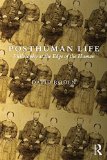November 26, 2014

Greek Models of Mind and Self by A.A. Long (Harvard University Press, 2014)
(amazon.co.uk)
Book description from the publisher:
This lively book offers a wide-ranging study of Greek notions of mind and human selfhood from Homer through Plotinus. A. A. Long anchors his discussion in questions of recurrent and universal interest. What happens to us when we die? How is the mind or soul related to the body? Are we responsible for our own happiness? Can we achieve autonomy? Long asks when and how these questions emerged in ancient Greece, and shows that Greek thinkers’ modeling of the mind gave us metaphors that we still live by, such as the rule of reason or enslavement to passion. He also interrogates the less familiar Greek notion of the intellect’s divinity, and asks what that might mean for us.
Because Plato’s dialogues articulate these themes more sharply and influentially than works by any other Greek thinker, Plato receives the most sustained treatment in this account. But at the same time, Long asks whether Plato’s explanation of the mind and human behavior is more convincing for modern readers than that contained in the older Homeric poems. Turning to later ancient philosophy, especially Stoicism, Long concludes with an exploration of Epictetus’s injunction to live life by making correct use of one’s mental impressions.
An authoritative treatment of Greek modes of self-understanding, Greek Models of Mind and Self demonstrates how ancient thinkers grappled with what is closest to us and yet still most mysterious—our own essence as singular human selves—and how the study of Greek thought can enlarge and enrich our experience.
Comments (0)
- culture,mind,new books,self,Uncategorized
September 25, 2014

Posthuman Life: Philosophy at the Edge of the Human by David Roden (Routledge, 2014)
(amazon.co.uk)
Book description from the publisher:
We imagine posthumans as humans made superhumanly intelligent or resilient by future advances in nanotechnology, biotechnology, information technology and cognitive science. Many argue that these enhanced people might live better lives; others fear that tinkering with our nature will undermine our sense of our own humanity. Whoever is right, it is assumed that our technological successor will be an upgraded or degraded version of us: Human 2.0.
Posthuman Life argues that the enhancement debate projects a human face onto an empty screen. We do not know what will happen and, not being posthuman, cannot anticipate how posthumans will assess the world. If a posthuman future will not necessarily be informed by our kind of subjectivity or morality the limits of our current knowledge must inform any ethical or political assessment of that future. Posthuman Life develops a critical metaphysics of posthuman succession and argues that only a truly speculative posthumanism can support an ethics that meets the challenge of the transformative potential of technology.
See also: Author’s website
Comments (0)
- human evolution,mind,new books
January 20, 2014

The Bilingual Mind: And What It Tells Us About Language and Thought by Aneta Pavlenko (Cambridge University Press, 2014)
(paperback – 2/28/14), (UK kindle ed.), (amazon.co.uk – paperback ed.)
Book description from the publisher:
If languages influence the way we think, do bilinguals think differently in their respective languages? And if languages do not affect thought, why do bilinguals often perceive such influence? For many years these questions remained unanswered because the research on language and thought had focused solely on the monolingual mind. Bilinguals were either excluded from this research as ‘unusual’ or ‘messy’ subjects, or treated as representative speakers of their first languages. Only recently did bi- and multilinguals become research participants in their own right. Pavlenko considers the socio-political circumstances that led to the monolingual status quo and shows how the invisibility of bilingual participants compromised the validity and reliability of findings in the study of language and cognition. She then shifts attention to the bilingual turn in the field and examines its contributions to the understanding of the human mind.
Google Books preview:
See also: Author’s webpages
Comments (1)
- language,mind,new books





